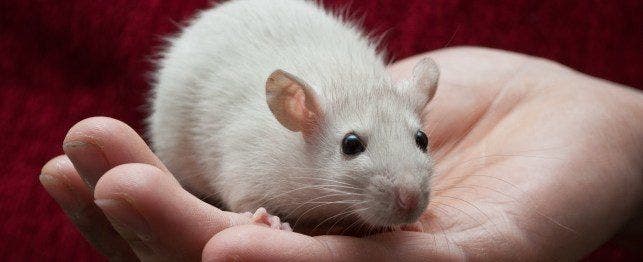
Understanding Your Rat
Twenty minutes of observation will give you the perfect window into a rat’s character. If you watch the rat you intend to buy interacting with other rats his age, you will see if he is the cage bully or if he shares the food bowl nicely with others. You will find that each rat has his own “personality,” but there are also several distinct actions that make up the universal rat language of happiness and distress. Understanding your rat is often as simple as recognizing these behaviors and signs.
Rats Are Social
Rats are social animals. They love sleeping in piles, squabbling over crumbs with their cage mates and wrestling together playfully. Your pet may be happiest with other rats, even though most rats are “people pleasers.” They learn to trust humans and actively seek out the attentions of their owners. This tendency sets rats apart from other small mammals such as hamsters, which seem to tolerate rather than enjoy human company.
If you spend time with a happy, healthy rat colony, you will notice the rats licking and pawing over each other’s ears, coats, noses and tails. Mutual grooming is an affectionate action, reminiscent of young life and the caretaking behaviors of a mother rat. Rats that groom each other are happy rats, and you should consider it a great compliment if your rat starts licking and grooming your fingers or hair during a quiet moment together. He is trying to care for you, not getting ready to take a bite out of your hand.
Rats Grind Teeth When Happy
Rats also grind their teeth when they’re happy. This behavior is called bruxing, and it is often compared to purring in cats. You may not notice this soft sound at first unless your rat is perched on your shoulder at ear level. Once your rat gets going, it may seem as if the vibration generated by his grinding teeth carries through his entire body, causing him to shake all over.
This happy tooth grinding should not be mistaken for the warning tooth chattering that rats make when they are agitated. Your rat’s body language should tell you whether or not he is distressed. If the hair on his back is standing up or if your rat’s whole body is stiffened and alert, eyes steely and focused, then he is likely upset. A rat may make screeching or hissing sounds when he is confronted or attacking another. If your rat shows signs of anger or acts viciously toward another rat in the colony, separate him from the group and give him time to calm down before you reintroduce him to the cage.
The Dominant Rat
Playful posturing is a regular part of the rat social hierarchy. You’re most likely to witness dominance drama when you introduce a new rat to your colony. After a sniff-over and a brief wrestling match, the less-dominant rat in a new pair may end up pinned on his back on the floor. He should suffer no serious injuries, save injured pride. The squeaks and squeals you hear from your rats when they’re sparring playfully like this are indignant protests (“Hey!”) rather than shrieks of distress. Separate your rats if one bites another hard enough to make him bleed.
It’s important to spend time with your rats every day so that you can recognize any abnormal anti-social behavior. If one of your pets seems unusually listless, shows little interest in food or isolates himself from the rest of the pack, then there is probably something wrong with him. Get help from a veterinarian that specializes in small mammals as soon as possible.